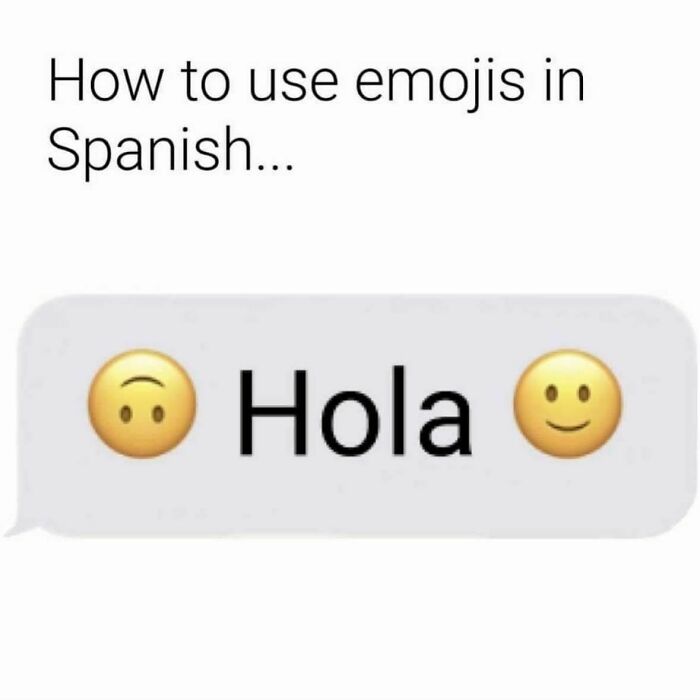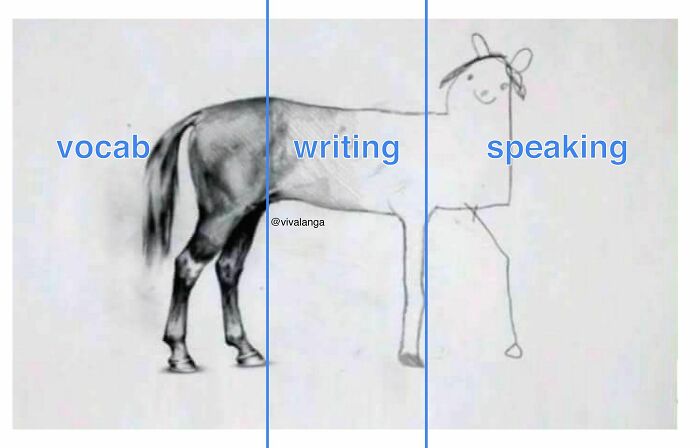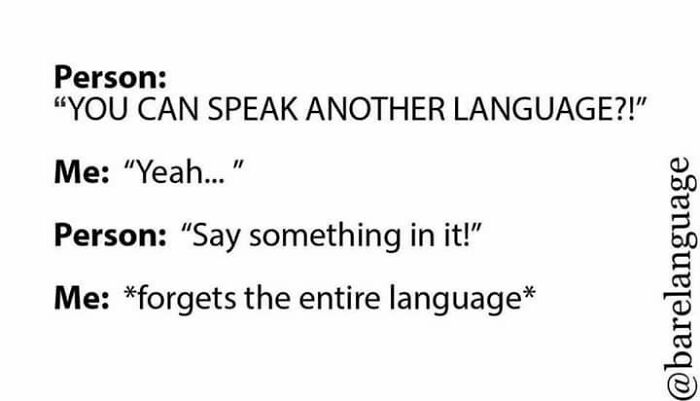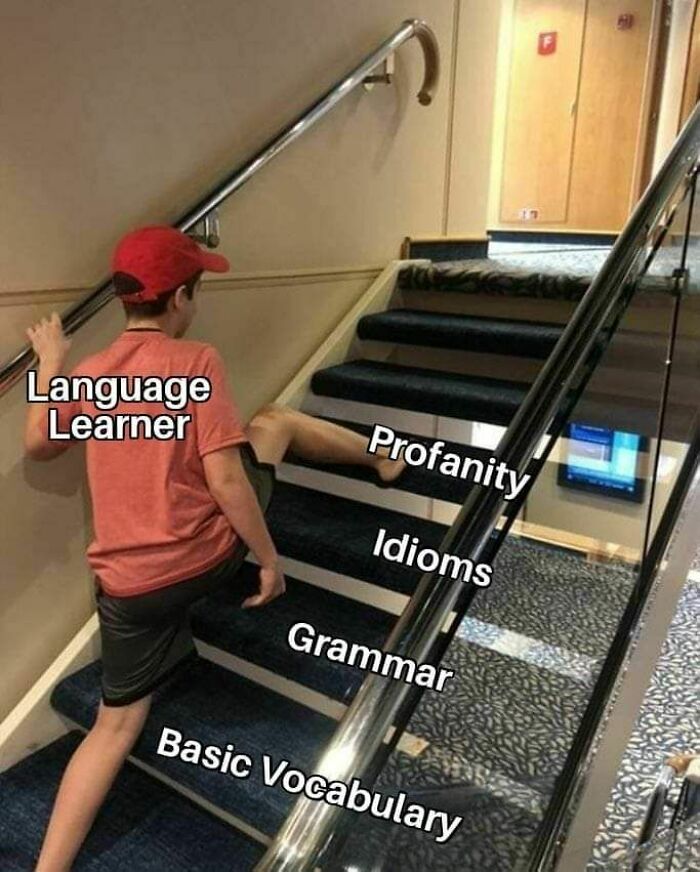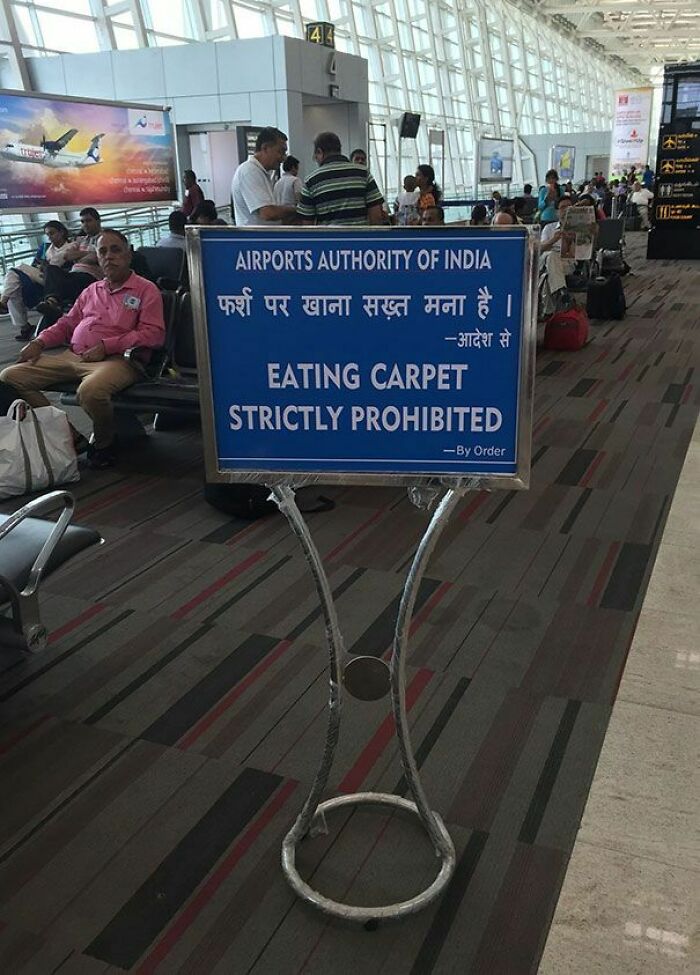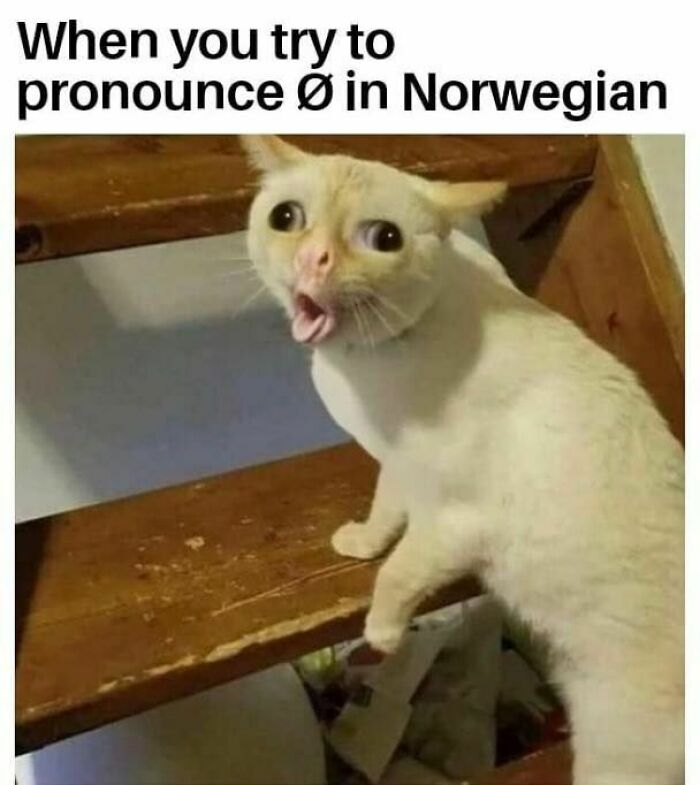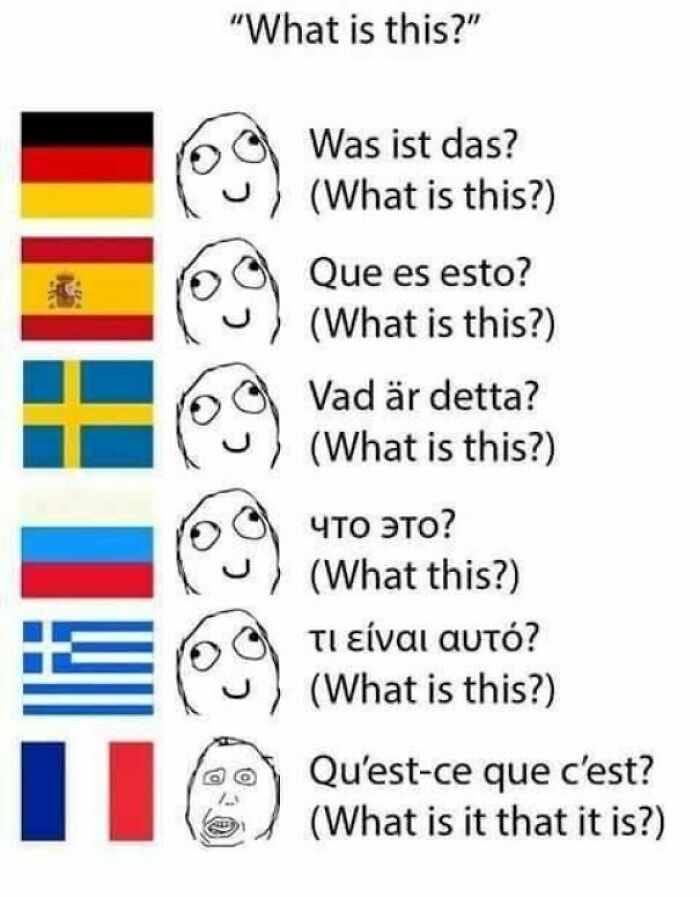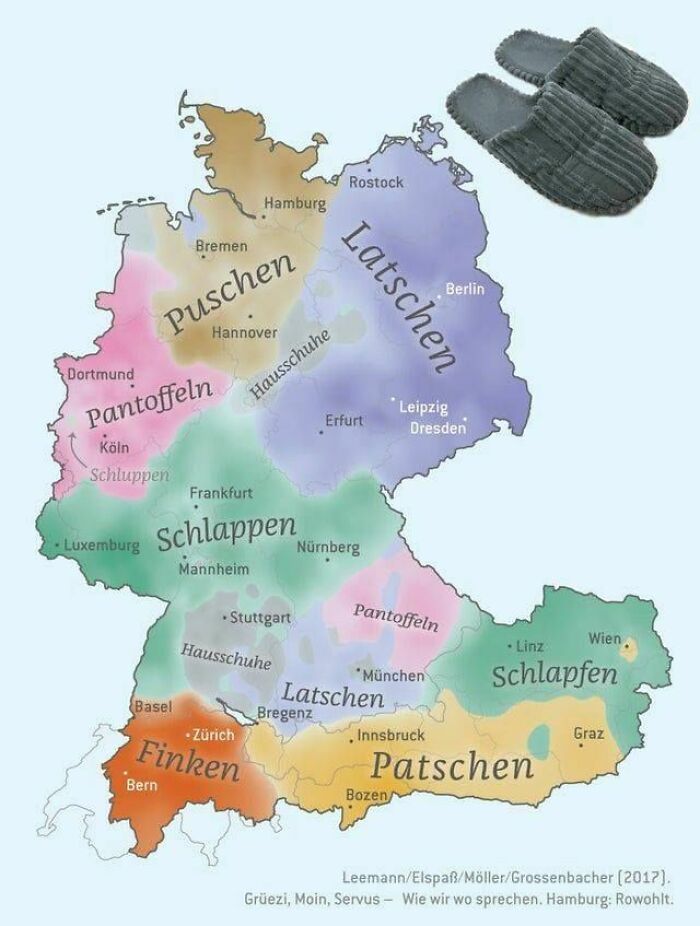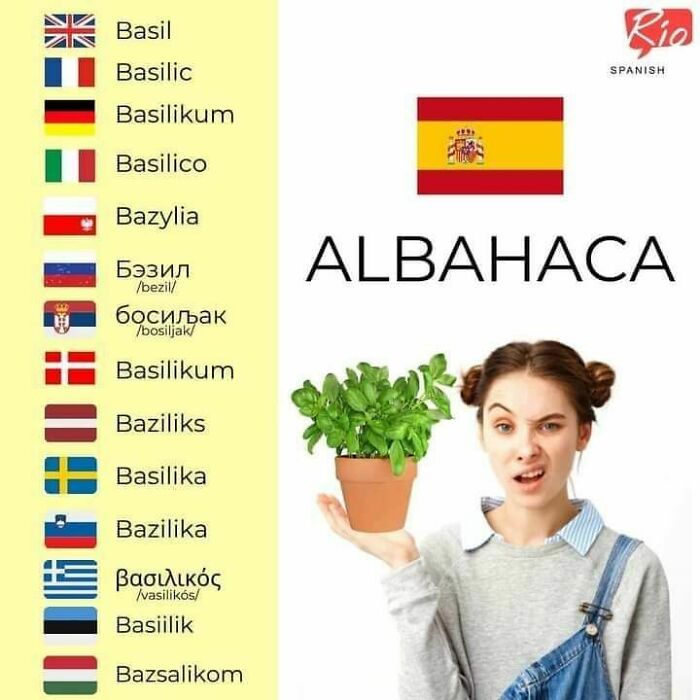
This Facebook Page Makes It Clear How Silly Linguistics Is, Here Are 40 Of Their Funniest Posts
InterviewLanguages are fascinating. English has plenty of words that fly in the face of grammar rules we’re taught in school, and learning another language makes you question everything you thought you understood about grammatical structure and what items should be called. Plus, it’s pretty amusing to view a language from the lens of an outsider. For example, the word for thank you in Lithuanian sounds like a sneeze (ačiū), and the word for bread sounds like the name Donna with a thick New York accent (duona). The Swedish language also has a host of words that seem silly when read by a native English speaker, including the words for good (bra), urine (kiss), and speed (fart). (I know they’re pronounced differently, but not everyone does!)
Ah, the wonderful world of linguistics. If you enjoy learning more about other languages, and your own, you’re in for a real treat. Down below, we’ve compiled some of the funniest posts from Steve the Vagabond and Silly Linguist’s Facebook page. From calling out how arbitrary spelling is in certain languages to noting words that sound silly to non-native speakers, we hope you enjoy this trip down linguistics lane.
Keep reading to also find an interview with Steve the linguist himself, and be sure to upvote the posts you get a kick out of. Feel free to share any other amusing linguistics facts you know in the comments. Then if you’re interested in checking out another Bored Panda article featuring hilarious grammar and spelling errors in English texts, you can find that right hear! Oh, I mean here!
More info: Facebook | Twitter | YouTube | SillyLinguistics.com
This post may include affiliate links.
To learn more about how Steve's linguistics page came about in the first place, we reached out to him via Facebook. When asked what inspired him to start the account, he told Bored Panda, "I have always loved languages and linguistics." We also asked if he could share a fascinating linguistics fact with us: "There are some languages that use cardinal directions (east, west, north, south) instead of left and right for directions." I don't have a wonderful sense of direction, so I would definitely struggle with that...
He also wanted to make it clear that the study of linguistics is for everyone. "Linguistics is the study of languages. All forms of speech are valid. All dialects are valid." And when it comes to why his page is so popular, Steve noted that, "Everyone loves words and languages, it seems. I focus on the fun side of things." And as far as the future of his account is concerned, Steve says that he only plans to make it bigger and better. So be sure to give the page a like on Facebook to follow its growth and see more language memes right here!
According to the Linguistic Society of America, “Linguistics is the scientific study of language. [It applies] the scientific method to conduct formal studies of speech sounds and gestures, grammatical structures, and meaning across the world’s 6,000+ languages.” Linguistics is a field that applies to us all, as almost every person on the planet speaks, reads or understands some form of language. Often, people even know more than one!
“Language use is an essential human ability,” the LSA writes on their site. “Whether it's telling a joke, naming a baby, using voice recognition software, or helping a relative who's had a stroke, you'll find the study of language reflected in almost everything you do. Linguists spend their days seeking answers to questions like the following and so many more, because language and linguistics play such a fundamental role in every human's life.”
Some of the questions linguists seek to answer are: How do you speak differently when you're talking to your friends, your parents, or your boss? Why do people who speak the same language as you still sound different from you? Why do languages die, and how can one on the brink of death be preserved?
Linguistics inherently plays an important role in all of our lives, but it can also bring us a lot of enjoyment. Steve the vagabond and silly linguist uses his platform to help others find the joy in studying languages. Becoming fluent in a foreign language is an incredibly hard task, but dipping your toe into the pond of linguistics can help you become much more curious about the world’s many tongues. And a few simple phrases in any language can go a long way. Just knowing how to say hello, thank you, excuse me, and ask for help can spare you some embarrassment while traveling and allow you to inform the locals that you’ve put in a bit of effort.
The last time I was traveling to the United States, I arrived in Austin, Texas and explained to the passport control officer that I had flown in from Lithuania. His face lit up, and he responded with, “Labas!” (Hi!) I was shocked that he knew even a single word, and he was thrilled to tell me that he also knew how to say thank you because he has some Lithuanian friends who are currently living in Chicago. I’m sure it’s extremely rare that he meets anyone who knows those words, and it was just pure coincidence that he got to check my passport. But it was a great moment that made us both smile, all thanks to his curiosity about languages.
I know someone who went to Korea and saw a sign there reading "Translation Failed".
I’m ashamed to admit that I’m not fluent in any other languages, but I know a handful of words and phrases in several languages thanks to growing up in Texas, classes in school and university, and living in a couple countries that speak their own languages. But even the small amount of foreign languages I know has come in handy several times in my life. For example, when I was living in Sweden, I made an appointment to get a tattoo in Stockholm. I had booked the session via email in English, but when I arrived, I was told that the artist I had an appointment with couldn’t come in that day. Instead, there was another man who spoke fluent Spanish and Swedish (he was originally from Chile) who would handle my art for me. Through my broken Spanish, broken Swedish and a bit of his broken English, the appointment turned out to be a success. Sometimes, it’s not crucial to be perfect or know everything. You just need to listen and understand enough to make yourself understood.
What a roller coaster ride Rick's life has been: obscurity to fame to obscurity to fame again.
I’ve always been a sucker for a great pun or play on words, so these linguistics jokes are right up my alley. But there are plenty of reasons to study linguistics. First of all, anything that gives you a wider global perspective is great. The more we learn about other languages and cultures, the greater we’ll be able to understand people living all over the world, even if we can’t communicate in the same language. Linguistics can also be a great field to study in terms of career opportunities. There are many jobs linguists can pursue, including becoming a professor of linguistics, a foreign language teacher, a translator, a speech pathologist, an English teacher, a diplomat, a text-to-speech developer, and a language rights advocate. There’s no shortage of linguists needed worldwide, and the demand is only growing as the need for multi-language speakers becomes greater every year.
Sometimes I can't remember a word in my native language but I know the English word.
I'm like Kelly Bundy, whenever I learn a new fact, I lose an old one.
If you’re looking for a sign to start learning a new language, here’s your push! It’s never too late, and it doesn’t have to be scary. Becoming fluent seems like a monstrous task that deters many people from starting at all, but being able to hold a basic conversation is a huge accomplishment that won’t take too much time as long as you’re a dedicated learner. We all know apps like Duolingo aren’t the best way to learn a language, but they are one route to take to pick up basic phrases and vocabulary. Along with that, it’s important to get used to reading and hearing the new tongue as well, so be sure to watch lots of Netflix or Youtube videos in the language (preferably with subtitles so you will learn how to spell and pronounce the words). Watching shows and films in another language is also a great way to learn how people actually talk, rather than the phrasing that a textbook will teach you, which often sounds formal or awkward to native speakers.
BP: posting something that literally has FÙCK as the FÙCKING PUNCHLINE, yet censoring it. For FÙCK'S sake, BP, either stop your censoring bullshít or don't post anything like this.
To inspire you to expand your linguistic knowledge, we consulted this article from the BBC where engineer Benny Lewis, who has become nearly fluent in seven languages, provided his insight on how he was able to learn so much. “The biggest barrier in the beginning is the lack of confidence,” Lewis told the BBC. “That got better and better for me [as I spoke].” His first tip was to create a script for yourself that will allow you to respond to simple queries from strangers without having to revert back to your native language. Always use what you know, and remember that it’ll be obvious you’re a foreign speaker. Others are likely to be patient and understanding of the fact that you’re trying.
That’s my language and I’ve given up, massive well done to anyone who has learnt it
When learning a new language, one of the first things you have to accept is that you’re going to make a fool out of yourself. You’ll likely do it often. But it’s just part of the process! Don’t be too hard on yourself, and simply learn from the mistakes you do make. It’s also best to fully immerse yourself in the language and around people who speak it fluently. “Practice makes perfect,” James North, associate director for instruction at the Foreign Service Institute, told the BBC. “But practice without feedback just makes perfect whatever you are practicing. The naïve learner does not have a perspective on what they are doing. It is really vital to have someone saying, ‘Yes you are on track’.”
As fun and silly as the posts on this list are, learning about linguistics can be really beautiful. “Every language is like a one-of-a-kind species,” the Canada Institute of Linguistics explains on their site. “It captures unique conceptualizations of the world and has its own ways of constructing words, phrases and sentences for communicating ideas. As we compare the words and structures of various languages, we come to a greater understanding of the world we live in. Apart from simply understanding the intricacies of world languages, this knowledge can be applied to improving communication between people, contributing to translation activities, assisting in literacy efforts, and treating speech disorders.”
Have you learned something new about your own native tongue or another language from this list? We hope you’re enjoying all of the word play and fascinating observations about languages, and be sure to keep upvoting the posts you find most hilarious. If you’re interested in finding even more of these posts that will teach you a bit more about our world, you can find the Facebook page for Steve the Vagabond and Silly linguist right here! And if you have any other amusing observations about the English language or your own mother tongue, feel free to share them with your fellow pandas down below!
I'm so mad at the word "oiseaux" for this reason. It means "birds". NONE of the letters are pronounced the way you'd think lol.
🙃Hola, ¿como estas hoy? ¿Tu bien? Yo soy un donut🍩.🙂
WITCHCRAFT!!! BURN THEM ON A PILE OF OLD DEATH-METAL GUITARS!!
Yes, there are a few songs I liked a lot before I actually understood the lyrics
Betty Botter bought some butter, but the butter, it was bitter. If she put it in her batter, it would make her batter bitter, but a bit of better butter, that would make her batter better. So, she bought a bit of butter, better than her bitter butter, And she put it in her batter, and her batter was not bitter. So, T'was better Betty Botter bought a bit of better butter.
England version: SQUARE UP BRUV SQUARE UP DO U THINK UR A BIG MAN MATE COME ON LETS GO
Reminds me of a joke a non native Portuguese speaker once did, how to speak EU Portuguese: 1st be Russian, 2nd get pissed drunk, 3rd try to speak Spanish.....
People always have like 11 day streaks and miss 5 days and I always thought that everybody has a 358 day streak
For non-Italian speakers: "telefono" means telephone, it was obviously asking for the phone number but the person that filled the form thought they were asking about what phone model they owned
One could think a pirate's favourite letter would be R, but honestly, their only true love is the C.
C**p this reminds me of a pub i use to go, but the buggers didn't had the " stick man " figures on their toilet Doors, they had de masculin and feminin symbols, which was way to stupid to know which One was which.... And never for a moment i found it wierd that the men toilet didn't had any urinals.... My friends had a great night mocking my a*s..
Hahaha. I sent an email to a Dutch company in English which started with "I am afraid I dont understand..." They replied "Dear Lenka, Please, don't be afraid". Hahaha.
I have two young sons and explaining to them the words in the English language, especially homonyms, always ends me with saying our language doesn't make any sense.
No hate or disrespect, I'm still trying to wrap my head around how the words they/them became words for an individual.
It happened a lot longer ago than I think you think.
Load More Replies...Hahaha. I sent an email to a Dutch company in English which started with "I am afraid I dont understand..." They replied "Dear Lenka, Please, don't be afraid". Hahaha.
I have two young sons and explaining to them the words in the English language, especially homonyms, always ends me with saying our language doesn't make any sense.
No hate or disrespect, I'm still trying to wrap my head around how the words they/them became words for an individual.
It happened a lot longer ago than I think you think.
Load More Replies...
 Dark Mode
Dark Mode 

 No fees, cancel anytime
No fees, cancel anytime 



































